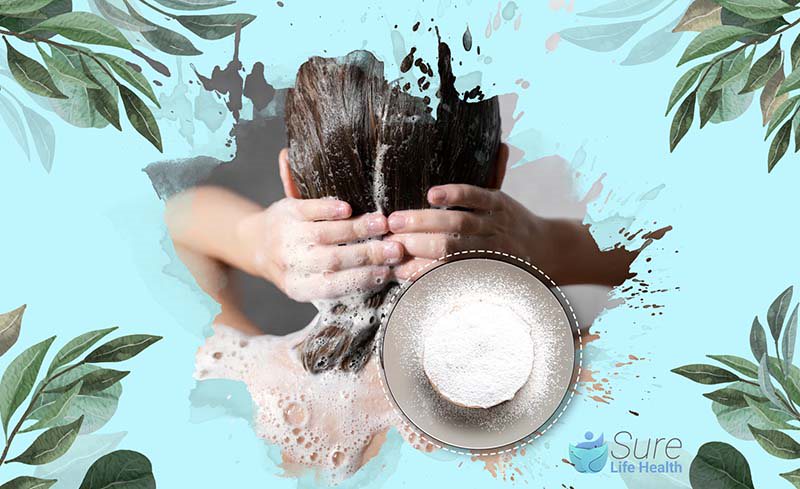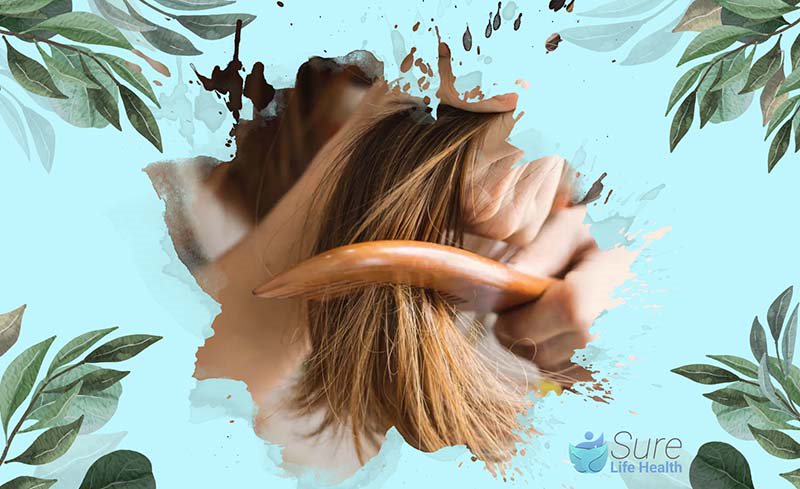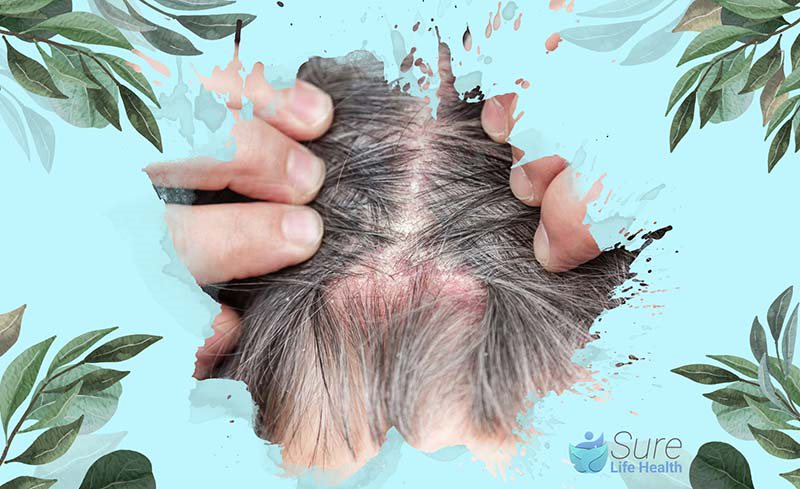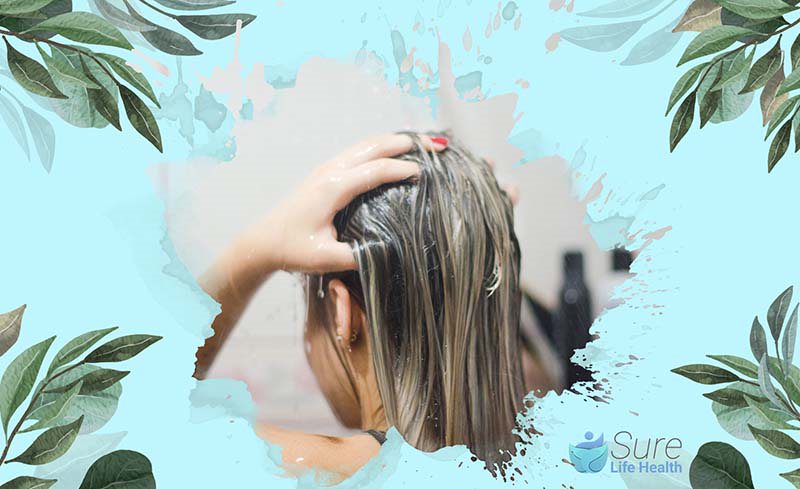Achieving beautiful hair often feels like a never-ending journey, filled with countless tips and trendy methods. One such trend, the “no shampoo” or “no poo” movement, has sparked interest and debate, particularly around the use of baking soda as a hair cleanser. Praised by some as a miracle solution, the practice of washing hair with baking soda has its fair share of supporters and skeptics.
The question remains: is it truly beneficial or potentially harmful? In this article, we explore “How to Wash Hair with Baking Soda“, examining both the potential benefits and the risks associated with this unconventional hair care method.
Advantages of Washing Hair With Baking Soda
Using baking soda dissolved in water can effectively eliminate buildup from oils, soaps, and other ingredients found in conventional hair care products. This thorough cleansing action leaves the hair feeling squeaky-clean, shiny, and remarkably soft.
Additionally, the gritty texture of baking soda serves as a natural exfoliant, aiding in the removal of dry skin from the scalp, promoting a healthier environment for hair growth.
For those concerned about the additives present in commercial shampoos or seeking a more economical alternative, baking soda can be an appealing option.
Furthermore, some individuals opt to follow up their baking soda wash with an apple cider vinegar rinse. Since baking soda has a high pH, the vinegar rinse helps to rebalance the scalp’s natural pH levels.
While some people incorporate this method into their daily hair care routine, many prefer to use it on a weekly basis.
Although anecdotal reports suggest positive outcomes from washing with baking soda, it’s essential to note that scientific evidence backing these claims is lack.

Disadvantages of Baking Soda Shampoo
While baking soda is renowned for its cleaning abilities on surfaces like grills and sinks, its abrasive nature may pose challenges when used on hair.
One significant concern is its high alkalinity compared to commercial shampoos, resulting in a pH level that surpasses that of the scalp.
Potential risks associated with using baking soda on hair include:
- Dryness: Despite its effectiveness in cleansing, baking soda can strip the hair of its natural oils, leading to dryness. While excessive oiliness can make hair appear greasy, a certain amount of oil is necessary for maintaining scalp health and imparting shine to the hair. Typical shampoos contain moisturizing ingredients to counteract dryness. Using a natural conditioner infused with oils like coconut or argan can help replenish lost moisture.

- Breakage: Baking soda, being a type of salt with tiny abrasive crystals, can be harsh on delicate hair fibers. This abrasive action may result in hair breakage, split ends, and overall damage.

- Scalp Irritation: Another concern is the potential for baking soda to cause scalp irritation, particularly for individuals with dry scalps, sensitive skin, or conditions such as eczema. Due to its abrasive and alkaline nature, baking soda may exacerbate existing scalp issues or trigger discomfort.

When Should You Use Baking Soda Shampoo?
Curious about when to use baking soda shampoo? Here’s a breakdown of when it might come in handy:
- Clearing Up Buildup: Baking soda works wonders in getting rid of gunk from hair products, oils, and minerals in hard water. If your hair feels heavy or looks dull because of buildup, using baking soda shampoo now and then can give it a good cleanse.
- Taming Oily Hair: If your scalp tends to get greasy, baking soda can help soak up that excess oil. This means you can go longer between washes and keep your hair feeling fresh.
- Fighting Dandruff: Some folks find that baking soda helps tackle dandruff by gently scrubbing away dead skin cells on the scalp. It can reduce those annoying flakes and itchiness.
- Natural Hair Care: For those who want to steer clear of shampoos with lots of synthetic ingredients, baking soda is a natural option for washing hair without harsh chemicals.
Notes:
- Avoid overusing baking soda, as it can dry out your hair. Use it sparingly and only occasionally.
- After using baking soda shampoo, make sure to moisturize your hair with conditioner or natural oils to keep it healthy and hydrated.

How to Wash Hair With Baking Soda Properly
If you’re keen on using baking soda to wash your hair (remember, just occasionally), here’s the right way to do it:
- Make the Baking Soda Paste: Mix two parts water with one part baking soda in a small bowl to create a paste.
- Apply to Your Hair: Gently spread the baking soda mixture onto your wet or dry hair, focusing on any oily areas on your scalp. Begin at the roots and work your way down to the ends of your hair.
- Let it Sit and Rinse: Allow the baking soda paste to sit on your hair for about three minutes, then rinse it out thoroughly. This step helps to remove buildup and excess oil.
- Wash and Condition: After rinsing off the baking soda, follow up with a gentle moisturizing shampoo and conditioner to keep your hair hydrated and healthy.
Notes:
- Be gentle when applying the baking soda paste to avoid damaging your hair or irritating your scalp.
- Use lukewarm water to rinse out the baking soda mixture, as hot water can strip your hair of its natural oils.
- Adjust the baking soda-to-water ratio according to your hair’s needs. If your hair is particularly oily, you may need a stronger baking soda solution, while drier hair types may require a more diluted mixture.

Who Should Use Baking Soda on Hair?
Wondering who should give baking soda hair treatments a try? According to experts, it’s not something for regular use for anyone. It’s just too harsh to use frequently.
Even occasional use (maybe once a month) should be approached with caution, particularly for those with very oily hair or scalps, advises Brado.
However, if you already struggle with dry scalp or hair, or if your hair is damaged or color-treated, baking soda is a no-go. Its drying effects outweigh any potential cleansing benefits for your scalp and hair.
Notes:
- If you have concerns about how baking soda might affect your hair type or condition, it’s best to consult with a dermatologist or hairstylist before trying it out.
- Consider alternative cleansing methods, such as gentle shampoos formulated for your specific hair needs, if baking soda isn’t suitable for you.
Alternatives to Baking Soda Shampoo
If you’re drawn to natural hair care but want to explore alternatives to baking soda, there are plenty of options to consider. Here are some natural ingredients tailored to various hair needs:
- Coconut Oil: Known for its moisturizing properties, coconut oil is excellent for sealing in moisture, making it ideal for individuals with dry hair. You can find products containing coconut oil at most natural food stores or online.
- Aloe Vera: With its enzyme content, aloe vera can stimulate hair follicles, promoting hair growth, and it also works wonders for soothing dry, irritated scalps.
- Jojoba Oil: Similar in composition to the scalp’s natural oils, jojoba oil can help balance oil production and treat dry hair. You’ll find a variety of jojoba oil products available online.
Conclusion
In conclusion, while exploring “How to Wash Hair with Baking Soda” it’s important to recognize that baking soda’s pH of 9 significantly exceeds that of the scalp, which can potentially harm the hair. Continued use of baking soda may strip away the hair’s natural oils, resulting in breakage and increased fragility.
Although individuals with very oily hair may experience some benefits from using baking soda, it should be approached cautiously and for a limited duration. It’s essential to remember that natural doesn’t always equate to suitability for every purpose.
While baking soda can effectively eliminate excess oil, it is likely not the optimal choice for most individuals’ hair care needs. Therefore, when considering how to wash hair with baking soda, weigh the potential risks against the benefits to make an informed decision.
Be sure to check out more insightful blogs on hair care and wellness from SurelifeHealth as you continue your journey towards vibrant, beautiful hair.
Professor Gaye Cunnane, PhD, MB, FRCPI
As the Director of Health and Wellbeing at RCPI, Professor Gaye Cunnane is at the helm of initiatives aimed at enhancing the health and well-being of RCPI Trainers and Trainees. Her role extends beyond administration; she is also a respected clinical professor of rheumatology and a consultant rheumatologist at Trinity College Dublin (TCD) and St James’s Hospital. Prof. Cunnane’s medical journey began at TCD, where she graduated from medical school, and her path has been marked by both clinical and academic excellence.
After completing her basic clinical training in medicine, she embarked on PhD studies at University College Dublin and St Vincent’s University Hospital. Her research during this period was focused on prognostic markers in early inflammatory arthritis, a project that saw her collaborating with esteemed universities across Europe, including in Switzerland, The Netherlands, the UK, and Sweden.
Prof. Cunnane’s career took her to the University of California, San Francisco, where she spent three years delving into research on new treatments for lupus. Her academic prowess led her to the University of Leeds in 2001 as a senior lecturer, before returning to Ireland in 2003 to assume her current roles. She has also served as the National Specialty Director for Rheumatology training in Ireland, Programme Director for Basic Specialist Training with RCPI, and as a past President of the Irish Society for Rheumatology.
PUBLISHED ARTICLES
“Rheumatic disease differentiation using immunoglobulin G sugar printing by high-density electrophoresis”: Published in The Journal of Rheumatology, this study reflects her in-depth investigation into rheumatic diseases.
“Benefits of exercise in patients with rheumatoid arthritis: a randomized controlled trial”: This research work, highlighting the positive impact of exercise on rheumatoid arthritis, underscores Prof. Cunnane’s dedication to practical, patient-centered research.
Additionally, Prof. Cunnane has made notable contributions to the Annals of the Rheumatic Diseases, discussing early referral, diagnosis, and treatment of rheumatoid arthritis. She has also been involved in a study on the NCBI platform investigating exercise benefits in rheumatoid arthritis patients.
Professor Gaye Cunnane’s career is a testament to her commitment to improving patient outcomes in rheumatology through rigorous research, clinical excellence, and dedicated teaching. Her work continues to influence the field of rheumatology, both in Ireland and internationally.

